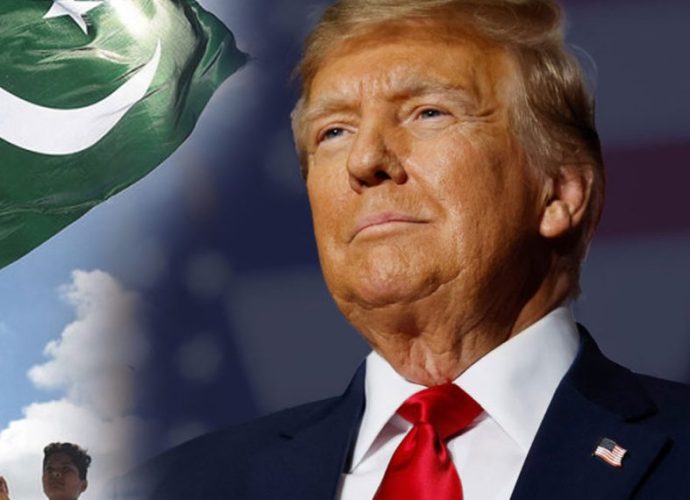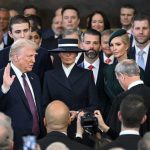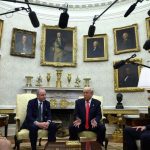Former US President Donald Trump recently praised Pakistanis as “brilliant people” and stated a strong desire to increase bilateral trade in an interview with Fox News. During a period of elevated military tensions, he also took responsibility for defusing a near-nuclear conflict between India and Pakistan.
Trump claimed that the diplomatic efforts of his administration had prevented the two nuclear-armed neighbors from going to war. “I believe there was going to be a nuclear war, or very near one. At a time when both nations were quickly increasing their military responses, he remarked, “And now everyone’s happy.” “Retaliation was in progress, missiles were being fired—it was becoming serious.”
He praised his efforts to diffuse the issue through economic involvement and behind-the-scenes diplomacy. He recounted his plan to use trade to advance peace: “I told my people, call them up—let’s start trading immediately.”
Trump praised his contacts with Pakistani leaders as well. “I had wonderful discussions with them. “They are brilliant individuals who create amazing products,” he remarked. “They would love to trade with us, but we hardly ever do.” Trump admitted that current trade volume is still low, but he also highlighted the possibility for better U.S.-Pakistan ties. He added inadvertently, “It does take two rectangle,” as if to highlight collaboration between the two parties.
On the other hand, Trump denounced India as “the country with the highest tariffs in the world” and attacked its trade policy. He did point out, though, that in negotiations with Washington, India has indicated a desire to lower these levies. He remarked, “India… they make it almost impossible to do business.” “However, are you aware that they are prepared to remove all of their tariffs against the United States?”
When Trump reflected on his diplomatic efforts, he called the standoff’s conclusion one of his presidency’s biggest achievements. “I’ll never be given credit for it, but it was a bigger success,” he remarked. “They were enraged, and these are powerful nuclear powers.”
He explained how the war threatened to degenerate into a devastating nuclear clash. “Tit for tat was the rule. More strikes, more rockets. “Go stronger, go harder,” was what everyone was urging. He mentioned nuclear weapons when he added, “And then it reaches a point where the next step is… the ‘N’ word.” The worst thing that may occur is the use of the “N” word in a nuclear context. They were also quite close. There was a great deal of animosity.
Trump promoted commerce as a vital element of world peace and security. “We worked not only for world peace but also for economic progress,” he remarked, adding, “I’m using trade to settle scores and to make peace.” Trade is a means of promoting peace.
Timeline of the Escalation
On April 22, a fatal attack in the resort town of Pahalgam in Indian Illegally Occupied Jammu and Kashmir (IIOJK) claimed 26 lives, sparking the most recent tensions between Pakistan and India. Despite without officially presenting any proof, India swiftly accused Pakistan of being responsible for the assault.
The 65-year-old Indus Waters Treaty was suspended, Pakistani nationals’ visas were revoked, the Wagah-Attari border crossing was closed, Pakistan’s High Commission in New Delhi was ordered to close, and diplomatic personnel on both sides were reduced as part of India’s hostile response on April 23.
India’s accusations were strongly denied by Pakistan, which also took reciprocal action through its National Security Committee (NSC). These included blocking Indian planes from entering Pakistani airspace, stopping commerce with India, and taking other preventative actions.
When missile attacks struck six cities in Punjab and Azad Jammu and Kashmir (AJK) on May 7, demolishing a mosque and killing dozens of people, including women and children, tensions reached a breaking point.
Pakistan’s military retaliated by shooting down a number of Indian aircraft, including three Rafale fighter planes, which are regarded as an essential component of India’s air fleet. India fired many Israeli-made drones during the course of the following two days, but Pakistan’s military destroyed them all.
Early on May 10, India conducted missile attacks against multiple Pakistani airbases, significantly intensifying the conflict. In retaliation, Pakistan launched Operation Bunyan-un-Marsoos, targeting important Indian military locations such as airbases and missile storage depots.
After intensive overnight negotiation, President Trump said a truce was reached by Saturday evening. Later, in separate comments, India’s foreign secretary and Pakistan’s foreign minister, Ishaq Dar, affirmed the ceasefire.












